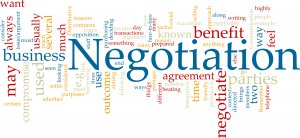 When we hear the word “negotiation” most of us think of high-powered deals being
When we hear the word “negotiation” most of us think of high-powered deals being
hammered out: a powerful sport figure’s agent demanding more money for his client, a peace accord in the Middle East, a pay increase for a union's members. The atmosphere is tense, the participants are tough and the stakes are high...
Like it or not, we are all negotiators. We have to negotiate every day with colleagues, suppliers and clients:
- Negotiation is a way of getting what you want from others.
- Negotiation is the process we use to satisfy our needs when someone else controls what we want.
Most sales people have just two ways of negotiating: soft or hard.
Soft negotiators want to avoid personal conflict and so make concessions readily in order to reach an agreement. They want an amicable resolution; yet often end up being exploited and feeling bitter.
Hard negotiators, on the other hand, see any situation as a contest of wills in which the side that takes the more extreme position and holds out longer fares better. They want to win; yet they often end up producing an equally hard response which exhausts them and their resources and harms their relationship with the other side.
There is, however, a third way to negotiate - a way neither hard nor soft, but rather both hard and soft. The method suggests that you look for mutual gains whenever possible, and that where your interests conflict you should insist that the result be based on some fair standards independent of the will of the other side.
By recognising the traits of a good negotiator, you can continually practice and sharpen your skills until you become better than you are right now.
The better you become, the more you can get done in less time. A good negotiator will try to address his/her own agenda as well as the agenda of the other person. Good negotiators go for win:win.
To learn more about negotiating why not attend our negotiating course.
